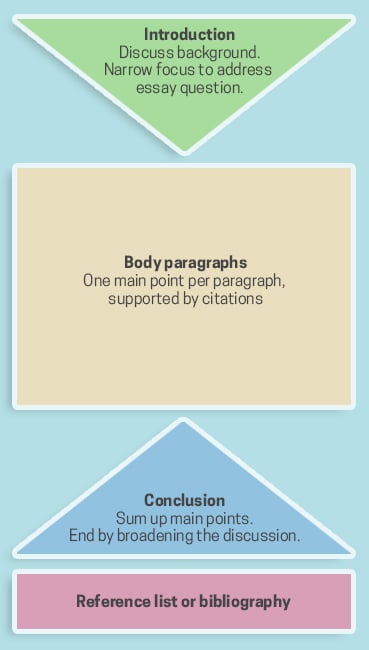Essay writing
When writing an essay, don't be tempted to simply summarise other writers' ideas. It is your discussion of the topic and your analysis of their ideas that should form the backbone of your essay.
An essay is a type of assignment in which you present your point of view on a single topic through the analysis and discussion of academic sources. Usually, an essay has the format of an introduction, body paragraphs and a conclusion.
Critical analysis is essential to essay writing. One way you can demonstrate this is by summarising and paraphrasing other writers and by comparing, contrasting and evaluating their ideas. You can use this analysis to construct your own opinions, questions or conclusions.
When writing an essay, you need to have a clear position on a topic (sometimes called a thesis statement) in the introduction. You then support your thesis statement in the body of the essay, using relevant ideas and evidence from appropriate sources. It is important that you present your own ideas, opinions and analyses throughout your essay. When you use someone else’s ideas, you must correctly acknowledge it through referencing.
Essay writing is different to:
- reflective writing, which is based primarily on your personal experiences
- report writing, which focuses primarily on reporting facts and making recommendations.
What will my marker be looking for in my essay?
If in doubt, ask early! Your lecturer and tutor are there to help – and you can always ask for further advice from a Writing Mentor or a Language and Learning Adviser. In general, your marker will be looking for evidence that you have:
- Answered the essay question directly.
- Met the assignment criteria.
- Drawn on discussions from weekly seminars and classes (your unit’s weekly topics should be your guide for all of your assessments).
- Provided a position on, and shown understanding of, the topic.
- Completed the set and recommended readings.
- Discussed and analysed sources and formatted them in the required referencing style.
- Planned your essay so that is readable, clear and logically sequenced and with a distinct introduction, body and conclusion.
- Kept within the set word limit.
How much should I write?
Again, always consult your unit guide and assessment instructions for exact details of your assignment. These should clearly state the required word count for your assignment. Do not go dramatically under or over this amount. Usually about 10% over or under is acceptable – but always check with your lecturer first.
Planning your essay well before the due date will result in less stress and also less time writing, as you will know exactly how many words you need for each section. If you use the introduction, body and conclusion model, it is recommended to have one main idea per body paragraph. For example, if you have to write a 1000-word essay you might have three body paragraphs of approximately 250 words each, leaving 125 words for both the introduction and the conclusion.
A reference list or bibliography – formatted according to your referencing style – on a separate page at the end of your essay is also usually required. Normally this is not included in the word count but check with your lecturer or tutor to be sure.
Below are some ideas for structuring your essay. You should always check the assignment criteria and other information in your unit site for specific requirements. If you are not sure, you shouldask your lecturer or tutor. You can also get further advice from a writing mentor or a Language and Learning Adviser.
Try to begin and end each paragraph with your own thoughts rather than quoting or paraphrasing someone else’s words. Remember that your marker will be looking for your opinion, your discussion and your analysis of ideas.
The introduction
Remember that these are the first words your marker will read so always try to make a great first impression to ensure that you provide your marker with a clear and accurate outline of what is to follow in your essay. Don’t go into too much detail in the introduction. Save the detail for the body of your essay. You should try to include the following:
- Provide background information about the topic. Introduce and define some of the key concepts discussed in the essay.
- Respond directly to the essay question and clearly state what your essay intends to achieve.
- Provide an overview of some of the main points, or direction, of the essay.
- Be sure to revise the introduction in your final draft so that it accurately reflects any changes you may have made to the body and conclusion of your essay.
Body paragraphs
- Start each paragraph with a topic sentence. This is the main point of your paragraph and everything within this paragraph should relate back to it.
- Each main point should be relevant to your essay question or thesis statement.
- Integrate evidence and examples into your paragraph from your readings to support your point. Do not simply present evidence but analyse it at each stage, always relating it back to your assignment question.
- Be formal, objective and cautious in your writing.
- All sources must be cited in text in the referencing style required by your unit (citations are also listed in a bibliography or reference list at the end of the essay).
- Consider how you conclude your paragraph and how you might link it to the following paragraph.
The conclusion
Conclusions are primarily for summing up what you have presented in the body of your essay. No new information is presented in the conclusion. Use synonyms and paraphrasing so that you do not repeat all your main points word for word.
- Summarise your argument and draw on some of the main points discussed in the body of the essay but not in too much detail.
- Tell your reader how your essay has successfully responded to the essay question.
- You may return to discuss the background/context of the topic, if relevant.
- Where you see a gap in knowledge, you might provide suggestions for further research (optional).
Reference list or bibliography
- Create a reference list or bibliography – with full bibliographic details – according to the referencing style required by your unit.
Linking words clarify for the reader how one point relates to another. An essay flows cohesively when ideas and information relate to each other smoothly and logically.
Here are some common linking words used to:
- Introduce and add ideas
firstly, secondly, finally, also, another, too, moreover, furthermore, as well as - Illustrate ideas
for example, to demonstrate this - Show a result or effect
accordingly, therefore, as a result, thus, in order for this to occur - Compare ideas
similarly, likewise - Contrast ideas
in contrast, however, but, in comparison, despite, on one hand ... on the other hand ... - Restate and clarify
in other words, to put this another way, this could also be defined as - Sum up or conclude
therefore, so, to summarise, to conclude, in conclusion, finally
You should also avoid repeating key names and words too many times. Instead, use pronouns that refer back to earlier key words. For example: it, they, their, this, these, that, those
Further examples of linking words in academic writing:
Common linking words, University of Wisconsin
Academic phrasebank, Manchester University
Planning and researching
- Use the Deakin Assignment Planner to get a better idea of the time required to complete your essay.
- Watch video - Analyse the assignment question.
- Stuck? Ask your tutor or Study Support.
- Gather relevant information and supporting evidence from class notes and readings.
- Make further notes about any questions you have.
- Researching involves sourcing texts appropriate to your task.
- Use a variety of reading strategies.
- Take notes always with the assignment question in mind.
Initial writing
- It is important to begin writing as soon as soon as possible – think of writing as a process rather than a goal.
- Write an answer to the question in just one or two sentences – this can form the basis your thesis statement or argument.
- Plan and structure the body paragraphs of your essay into topic sentences with bullet points for each paragraph.
- Expand on each bullet point to build paragraphs based on evidence, - this will also require citations.
- Be formal, objective and cautious in your writing.
- Integrate your sources with your own analysis.
- After reviewing the plan and draft of body paragraphs, write the introduction and conclusion.
Drafting, reviewing and proofreading
- Take a break for at least a day and come back with a fresh pair of eyes.
- Review the marking criteria and assignment instructions again. Ask yourself: Have I done everything required?
- Draft and re-draft your essay.
- Read the paper aloud to find errors in sentence structure and word choice and refine it so there is a more natural flow.
- Save a back-up copy of each draft – and in more than one place!
- Get help with writing and referencing from Study Support.
- Don’t leave adding citations and references until the final draft – it can be very time consuming.
- Proofread your essay and make sure it follows any formatting requirements required by the unit.
- Ensure your referencing is correct and consistent.
Submission
- Save a back-up copy of your final essay before submitting your assignment!
- Submit your assignment according to your unit’s instructions.


